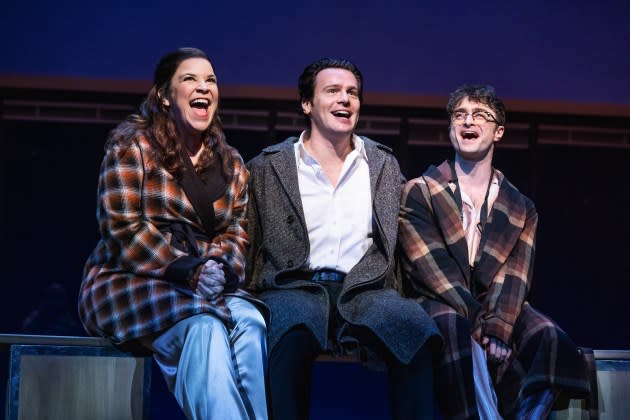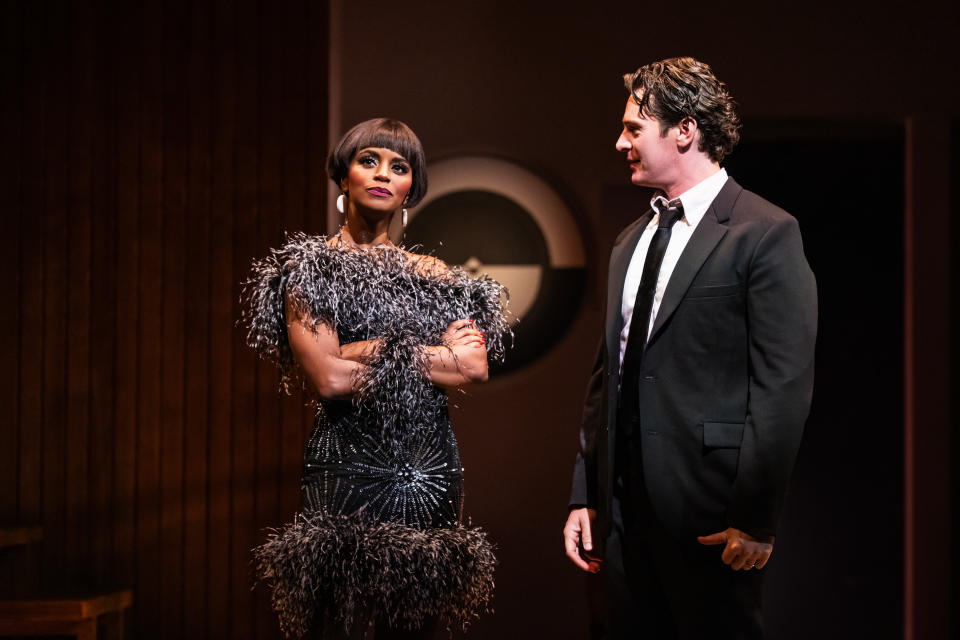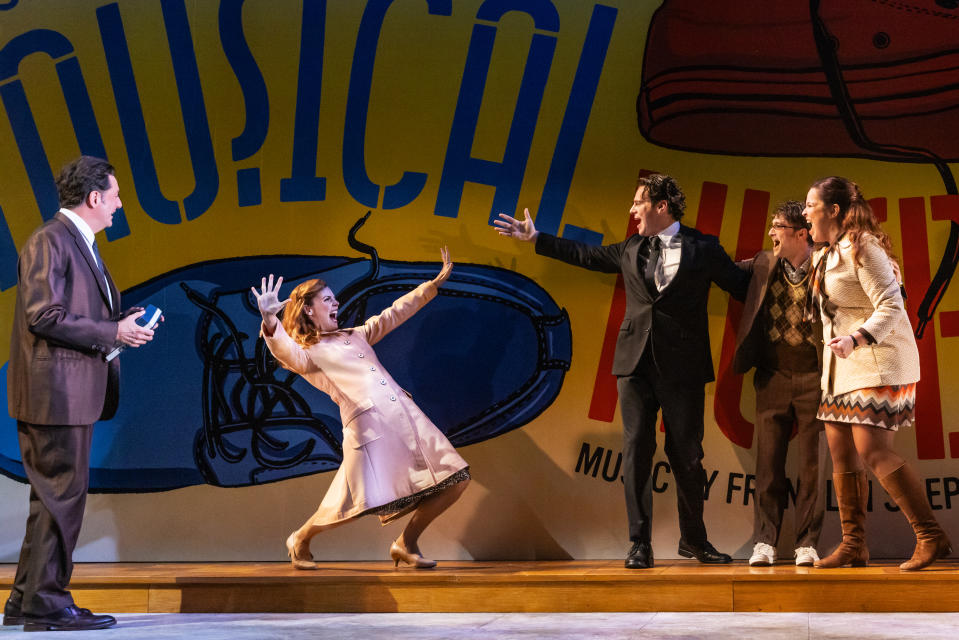‘Merrily We Roll Along’ Broadway Review: Daniel Radcliffe, Jonathan Groff & Lindsay Mendez Polish A Flawed Gem
- Oops!Something went wrong.Please try again later.
- Oops!Something went wrong.Please try again later.
- Oops!Something went wrong.Please try again later.

Troubled musicals, like troubled friendships, can often seem like defeats lying in wait, sponging up every last second of loving care, effort and good intention. So Maria Friedman’s smartly tended production of that most troubled of stage properties, the Stephen Sondheim-George Furth backwards musical Merrily We Roll Along deserves all the applause – and ticket-buying business – it’s getting at Broadway’s Hudson Theatre.
Opening tonight, the musical is drawing rapturous audience responses, no doubt in large part because of the splendid performances by three very appealing stars – Daniel Radcliffe, Jonathan Groff and Lindsay Mendez.
More from Deadline
Steven Lutvak Dies: Composer Of Tony-Winning Hit 'A Gentleman's Guide to Love and Murder' Was 64
'American Idol' Winner Nick Fradiani Joins Broadway's 'A Beautiful Noise' As Neil Diamond
But even if we could, for the sake of argument, put the talents of this delightful trio singing some of Sondheim’s loveliest songs, aside for a moment, the undeniable charm of this production has to be credited to a sort of relief – the relief of knowing that, for the most part, Friedman and her excellent creative team have ensured that we onlookers needn’t spend our Merrily time picking over the faults and fumbles that Furth and Sondheim could never quite eradicate.
Not that this new production of Merrily completely fills in and smoothes out the musical’s legendary potholes, but it certainly helps us step around them without too much effort or frustration. You’d be hard-pressed to imagine a better Merrily We Roll Along.
At least without being given some imaginary legal go-ahead to take a hatchet to Furth’s notoriously troublesome book. But more about that later.
Based on the original play by George S. Kaufman and Moss Hart, Merrily is the story of three longtime New York City friends – composer Franklin Shepard (Groff), lyricist Charley Kringas (Radcliffe) and one-time author, mostly drama critic Mary Flynn (Lindsay Mendez), a trio who began their ties that bind as college-age up-and-comers ready to take on their world.
It is, of course, the conceit of the musical that we don’t see those plucky, cocky go-getters, bound by youthful dreams, faith and confidence, until the final scene of Merrily We Roll Along. The musical is told in reverse, so that our first encounter with the friendship reveals it frayed beyond (seeming) repair. The scenes and the songs move from post-friendship 1976 to budding friendship 1957. Unlike the characters, we carry the sad ending with us even during the earlier good times, lending the entire musical an at-times unbearably sad tenor.
Fortunately, knowing that the happy ending (happy beginning? sad ending?) lies in wait for us is made tolerable by some of Sondheim’s most beloved musical numbers (and a few clunkers, but, hey, nothing’s perfect except Into The Woods, Company and Sweeney Todd). As for stand-alone songs – the ones that are often performed in revues and tributes, there’s “Old Friends,” “Growing Up,” “Good Thing Going,” “Our Time,” “Opening Doors” and two versions of that most heartrending of heartrending songs, “Not A Day Goes By.”
In this production, they’re all performed to a fare-thee-well (the sad break-up version of “Not A Day Goes By,” performed by Katie Rose Clarke as Frank’s first wife Beth, has been improved since this production debuted Off Broadway last year, with Clarke toning down the distracting sobs that marred her performance the first time around).
Elsewhere, the Broadway production maintains the high quality of the Off Broadway staging, with Tim Jackson’s pleasantly unobtrusive in-story choreography, Soutra Gilmour’s period-delineating costume design as appealing as her lovely scenic design, Amith Chandrashaker’s nostalgic, warm-glow lighting design and a sound design (by Kai Harada) that makes terrific use of the Hudson’s excellent acoustics and gives Jonathan Tunick’s fantastic orchestrations all the room needed to enchant. Cookie Jordan’s hair and wig design deserves a mention, too, as it takes us on a pleasing (and accurate) walk through the decades.

The action begins in 1976, at a ritzy Los Angeles poolside party being thrown by the industry’s hottest producer of profitable schlock, Franklin Shepard. Played out on Gilmour’s gorgeous Mid-Century Modern Cali-chic house set – all boxy shapes and windows, with Chandrashaker’s luscious lighting design making every minute of a setting sun more seductive than the last – the party is little more than an excuse for back-patting (Frank’s back) and infidelity (again, Frank’s). Whatever dreamy, youthful longings for artistic credibility and significance may once have existed for Frank are long gone, as are the shards of personal integrity we can only imagine, at this point in the production, might have existed.
Whatever hints of what was that we can glean come from Mary, Frank’s old New York friend and a real fish out of water here at his Hollywood mansion party. She’s now a mean drunk, sloppy, disgusted by Frank’s moral failures and artistic betrayals. If Frank has turned himself into an unlikeable phony to anyone not on his payroll, well, Mary doesn’t have a payroll to protect her. She’s cruel and insufferable and pathetic, judging everyone she encounters, most of all Frank, the man she’s secretly loved for decades.
Actually, not so secret, and, yes, Frank notices her disdain, and its stings. Groff lets us know, without saying a word, that he still cares what Mary thinks. Just as he cares what Charley thinks – and Charley isn’t anywhere near. He and Frank haven’t spoken since a notorious NBC interview back in ’73, when Charley, fed up with Frank’s preference for easy Hollywood money over his more artistically significant collaborations with his old lyricist, vents, cruelly, during a joint interview on an NBC morning show.
But oh what a glorious vent. The lickety-split verbal avalanche that makes up “Franklin Shepard Inc.” is an early high point of the musical, and perhaps this production in particular, so well is it performed by Radcliffe. A jewel of both comedy and vitriol, the rapid-fire list of sing-song grievances [And the telephones blink/and the stocks get sold/and the rest of us he keeps on hold] is delivered by Radcliffe so (seemingly) effortless and with such gusto that he got a partial standing ovation mid-song at the reviewed performance. It is, almost certainly, the stuff of Tony nominations.
From here, we go backwards even further to see how this three-way friendship fractured, and this production, perhaps more clearly than most, puts the blame squarely on the shoulders of the cheating, avaricious, star-struck Frank. We watch as, in 1968, Mary and Charley, along with Frank’s very young son, welcome Frank home from a lengthy yacht cruise, hoping that the time away has helped the composer clear his head following a nasty divorce. Perhaps Frank will finally be ready to collaborate on the long-postponed Important Musical that he and Charley have been talking about for years.
Nah. There’s a sexy and very famous Broadway star (Krystal Joy Brown) turning Frank’s head. Working and friendship can wait.
One of the few great but flawed stage musicals in which the flaws are front-loaded in the first act, Merrily We Roll Along gets better – not perfect, but better – in Act II. We open with a fine bit of razzle-dazzle in which that sexy, famous Broadway star delivers the crowd pleasing show-within-the-show number that’s meant to introduce us to the big 1964 Broadway success that catapulted Frank and Charley to success. And “Gussie’s Opening Number” works, both in convincing us of Frank and Charley’s talent and in Brown’s ability to razzle-dazzle us in the here and now.

The same can’t be said of 1960’s silly, dated gently satirical revue – about the pre-assassination Kennedys – that comes during the duo’s Off Broadway dues-paying era; it’s neither funny, catchy nor convincing. (It’s one of two misfires baked into the musical’s second act, the other being the mean-spirited “The Blob,” the title referencing a nickname given by the Broadway star to New York’s know-it-all single-minded cultural elite who consume and critique all the hottest and latest artistic offerings. (The Blob, as usual, is represented here by the fey, trendily dressed snark-makers who move en masse and blob-like from gathering to gathering; I couldn’t help recalling Fran Lebowitz’s recent lament for the all those “knowing audiences” lost to AIDS, the cultivated, opinionated scene makers who would only be appreciated in their blob-like absence.)
Furth’s book also betrays a datedness in other ways, like Charley’s late-1960s knee-jerk antipathy to Hollywood (the big-screen Cabaret and Fiddler are right around the corner, making Charley seem at least as lacking in vision as he is filled with integrity), but set against Sondheim’s magnificent music any gripes about the book can seem churlish. Well, almost any: The biggest flaw in Merrily has nothing to do with structure, but rather in characterization, specifically the depictions of the women. Gussie, Frank’s Broadway star second wife, is manipulative, duplicitous and nasty enough to toss iodine into the eyes of a romantic rival. Beth, Frank’s first wife, is a drag on her husband’s artistic endeavors almost from the start, pleading with him to sell out in order to feather the family nest.
And then there’s Mary, ostensibly the third and equal piece of this friendship trio, and third she is, equal she isn’t. While the men are filled with talent and ambition (either artistically or financially), Mary, despite a few thin references to a best-selling book to her credit, is defined almost entirely by her vicinity to Charley and, especially, Frank, for whom she carries a decades-long torch. She’s a satellite, as surely as the Sputnik that soars overhead while the youthful trio dream of future glory.
Even the relatively minor character of the sweet-natured, sad-sack Broadway producer Joe Josephson gets a more rounded characterization than Mary, Beth or Gussie – not to mention the better of the show’s biggest laughs – and it’s not just because Joe’s portrayer Reg Rogers is so very, very good (which he really, really is). How interesting it would be to see a Company-style gender-reversed production of Merrily We Roll Along.
In most productions of Merrily, the musical ends with that Sputnik sighting, leaving Frank, Charley and Mary drunk on hope, and leaving the audience deflated in its knowledge of the hangover to come.
But Friedman, in what might be the production’s single greatest contribution to the legacy of this musical, gives Frank a silent moment alone after the trio’s Sputnik-watching rooftop scene. But this isn’t just Frank straggling behind as his friends wander off – this Frank seems to be the middle-age self-loathing version we last saw at the Hollywood party that opened the show. Here, pensive and surrounded by stars in the sky (and throughout the theater), the friendless Frank seems to have a look of realization in his eyes. Could it be that the trip down memory lane, the entire show in other words, was not a stage gimmick at all, but Frank’s Scrooge-like revisiting of his past?
I believe so, though Friedman and Groff leave enough wiggle room to leave enough room for debate. If my interpretation is correct, Merrily We Roll Along, Sondheim’s greatest troubled musical, has finally gotten the ending it deserves, with just the barest chance and hope of escaping fate.
Title: Merrily We Roll Along
Venue: Broadway’s Hudson Theatre
Director: Maria Friedman
Book: George Furth
Music: Stephen Sondheim
Cast: Daniel Radcliffe, Jonathan Groff, Lindsay Mendez, Krystal Joy Brown, Katie Rose Clarke, Reg Rogers, and Max Rackenberg, Brady Wagner, Sherz Aletaha, Maya Boyd, Leana Rae Concepcion, Morgan Kirner, Corey Mach, Talia Robinson, Amanda Rose, Jamila Sabares-Klemm, Brian Sears, Evan Alexander Smith, Christian Strange, Koray Tarhan, Vishal Vaidya, Natalie Wachen, and Jacob Keith Watson.
Running time: 2 hr 45 min (with intermission)
Best of Deadline
SAG-AFTRA Interim Agreements: Full List Of Movies And TV Series
2023 Premiere Dates For New & Returning Series On Broadcast, Cable & Streaming
Sign up for Deadline's Newsletter. For the latest news, follow us on Facebook, Twitter, and Instagram.

